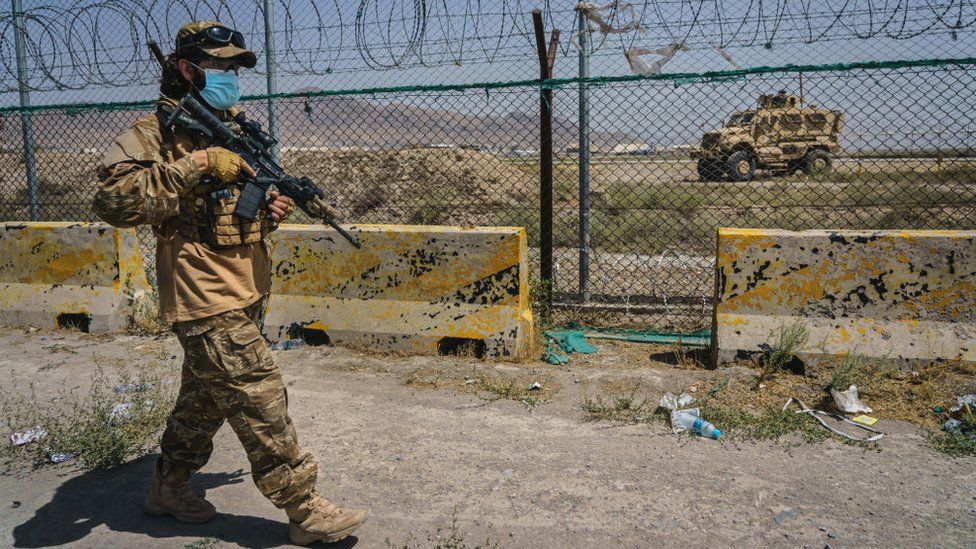The foreign secretary says the Taliban will be judged on their actions and if people can leave.

image sourceGetty Images
The foreign secretary is urging his international counterparts to work together to provide safe passage for eligible people out of Afghanistan.
Dominic Raab said the Taliban – who promised that those with authorisation would be able to leave – would be judged on their actions.
All US troops have now left, ending their 20-year presence in the country.
British troops arrived home over the weekend but the government vowed to help those eligible for resettlement.
More than 15,000 people had been evacuated by the UK since 14 August.
But it is feared that about 800 to 1,100 eligible Afghans, including those who worked for the UK government, and 100 to 150 British people were unable to get on evacuation flights.
Mr Raab’s comments came at a US-chaired virtual meeting for representatives from his G7 counterparts – including the US, Canada, Japan, Germany, France and Italy – as well as Nato and the EU on Sunday.
Turkey and Qatar – considered to have more influence over the Taliban than Western nations – also attended.
After the meeting, Mr Raab tweeted that he had spoken about the need for a “unified approach” towards Afghanistan.
“We’re working to allow continued safe passage of vulnerable Afghans, fight terrorism, secure humanitarian access and preserve regional stability,” he added.
The Foreign Office said Mr Raab had emphasised the “importance of working with like-minded partners” on safe passage and exit arrangements for eligible Afghans remaining in the country.
“He affirmed Taliban assurances that foreign nationals and Afghan citizens with travel authorisation will be allowed to depart the country, but underlined we must judge them on their actions, and whether people are allowed safe passage to leave.”
He also highlighted the need to work “with a range of international partners in order to exercise the maximum moderating influence on the Taliban”.
Mr Raab said preventing Afghanistan becoming a haven for terrorists was a priority, along with stability in the region and the need to protect human rights, the Foreign Office said in a statement.
The UN Security Council adopted a draft resolution on Monday evening, urging the Taliban to ensure safe passage to those wanting to leave Afghanistan and not to allow it to become a base for terrorism.
Prime Minister Boris Johnson said the resolution “makes clear that the international community stands with Afghans”.
“There can be no return to repression or terror,” he said. “We will push as one voice for safe passage, humanitarian access and respect for human rights.”
The resolution, drafted by the UK and France, was passed with 13 votes in favour and two abstentions, from China and Russia.
Barbara Woodward, UK ambassador to the UN, told the meeting that the humanitarian situation in Afghanistan also requires “urgent attention” and that the progress made in the last 20 years – including safeguarding human rights – must be protected.
“This resolution lays down a marker that the international community will be watching closely,” she said.
Foreign Office minister James Cleverly told the BBC the UK was “willing to engage” with the Taliban – but he could not give “absolute assurances” to those left behind.
“If [the Taliban] start acting like a government, if they start facilitating both internal travel and exiting from Afghanistan, then we will engage with them on that basis,” he said.
“But of course what we are not able to do, what no country is ever really able to do, is give an absolute cast-iron guarantee.”
Labour’s shadow foreign affairs minister, Stephen Kinnock, said the government had been “asleep at the wheel” when it came to getting people out of Afghanistan.
“We have to now face the reality, unpalatable as it is, that some cooperation is going be required. What that means is cooperation with conditions,” he said.
For those remaining in the country, Afghanistan could be on the brink of humanitarian disaster if international non-governmental organisations (NGOs) are forced to pull out, former international development secretary Rory Stewart warned.
“The Afghan government, which is now obviously the Taliban government, is running out of money,” he said. “It’s going to be very difficult to keep the water supply and electricity going. Much of the healthcare and education in the country is delivered by foreign NGOs and agencies.”

- Arrivals on official flights enter a 10-day Covid quarantine in a hotel
- Government officials and local authorities are trying to find them permanent homes
- A shortage of suitable accommodation means many will be placed in hotels
- Some will get refugee status and can live in the UK permanently
- Others will get a five-year visa to live and work in the UK – and can then apply for permanent residence
- Afghans arriving independently will enter the normal system for asylum claims – which has a backlog of 70,000 people
- These people cannot settle, or work, while their claims are considered

The talks come after survivors of a US drone strike targeting a suicide bomber told the BBC the attack ended up killing 10 members of one family, including six children.
Pentagon press secretary John Kirby said they were “not in a position to dispute” the reports of civilian casualties and they were “assessing and… investigating”.
He said there had been a “very real, a very specific and a very imminent threat” to Kabul airport from IS-K (Islamic State Khorasan Province), IS’s Afghan affiliate, ahead of Sunday’s strike.
The US had been on high alert since a suicide bomber killed more than 100 people outside the airport last Thursday. Among the dead were two British nationals, and the child of a British national.

